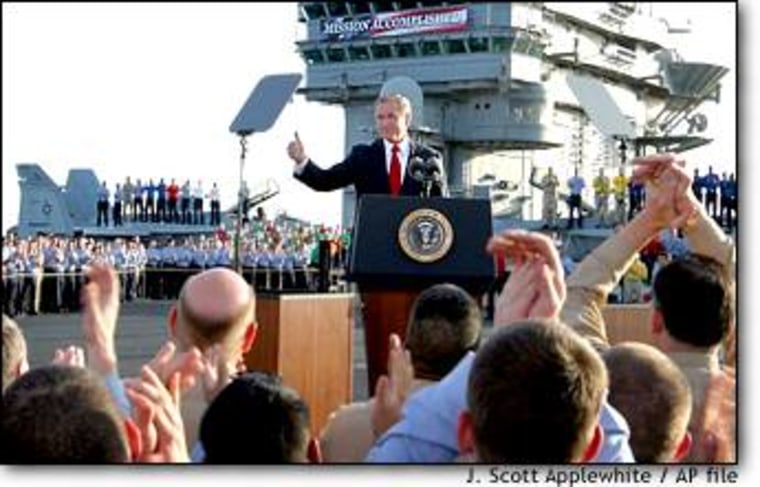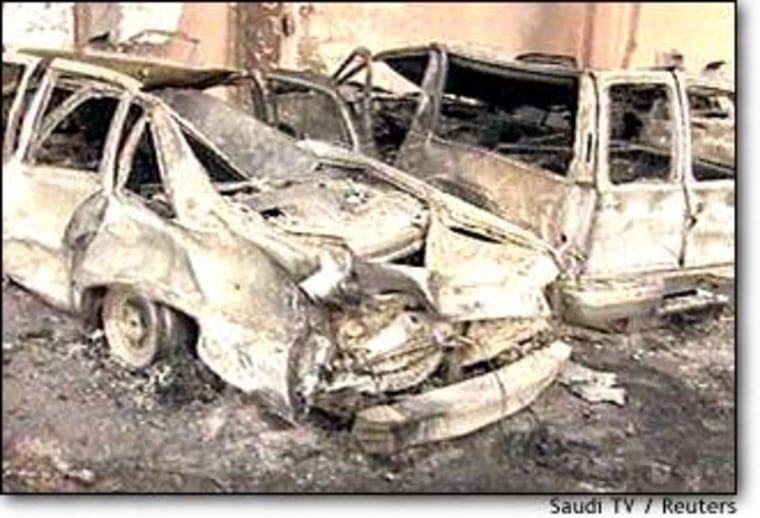Just under two weeks ago, George W. Bush landed on an aircraft carrier and declared the Anglo-American thrashing of Iraq to be “one victory in a war on terror that began on September 11, 2001, and still goes on.” On Monday, al-Qaida apparently drew a bold line under the president’s last four words, reminding Washington that the challenges of the post-Saddam Middle East will not be confined to the messy reconstruction of Iraq and the violence between Israelis and Palestinians.
THERE APPEARED to be little question about the targets or the timing of the attacks by the suicide bombers who unleashed their mayhem against residential compounds in the Saudi capital, Riyadh, overnight. The attacks, which U.S. and Saudi officials were quick to blame on the shadowy al-Qaida terrorist network, came on the eve of a quick visit Tuesday by U.S. Secretary of State Colin Powell, and they struck at the heart of the American relationship with Saudi Arabia.
Three compounds were hit, all of them in a district which houses some of the 35,000 expatriate Americans in the kingdom, many of them defense contractors working with Saudi Arabia’s military. While none of the approximately 10,000 U.S. service personnel appears to have been killed, the military nature of the targets is hard to discount. One of the blasts hit a compound housing employees of Vinnel, the American firm that has been involved in training the Saudi military for decades.
A separate strike Tuesday hit a joint Saudi-American company that helps maintain the U.S. military presence in the kingdom, Siyanco.
Among the dead, early reports say, are at least 7 Americans, with the total death toll around 30.
Some of the Americans killed, certainly, will hail from the tight-knit community of U.S. civilian defense contractors that has taken root in Saudi Arabia since the mid-1970s.
A DEADLY MESSAGE
InsertArt(1956600)No one has claimed responsibility for the attacks. However, if they eventually are laid to the al-Qaida network, this will be viewed as a bold strike against American interests in the region, as well as the Saudi monarchy.
In spite of the destruction of its base of operations in Afghanistan, and the toppling of what Washington describes as an al-Qaida ally in Baghdad, the network has confirmed its ability once again to carry its war to the very home of its enemies.
Further, contrary to claims that the terrorist network has been thrown into disarray, the attacks clearly were coordinated and carried out in spite of intelligence warnings that they might occur. On May 1, the very day Bush declared victory on the deck of the carrier Lincoln, the State Department warned that intelligence suggested an imminent strike against American interests in the kingdom.
InsertArt(1956601)Then, on May 6, the Saudi Interior Minister, Prince Nayef, in an event presented with unprecedented candor for the kingdom, announced that an arms cache and al Qaida terrorist plot had been uncovered after a shootout in the capital. The candor fell somewhat short, however, and it later emerged that 19 men described by Nayef as “al Qaida operatives” somehow escaped.
On Tuesday, Saudi officials said, at least some of those wanted men are believed to have died in the cars used to attack the Riyadh residential compounds.
THE POLITICAL DYNAMIC
For the White House, the timing is terrible. With efforts to stabilize Iraq faltering badly, the Bush administration had at least hoped that it could portray the victory there as a new blow against al-Qaida. In the run up to the war, Democrats and many Republicans questioned the president’s zeal for overthrowing Saddam Hussein even as Osama bin Laden, author of the Sept. 11, 2001 attacks on America and many other strikes at American interests overseas, still roamed free.
Several potential Democratic candidates for the presidency in 2004, in fact, are on the record as saying that the decision to launch a war in Iraq demonstrated a flawed sense of priorities on Bush’s part and, in any case, would only help al-Qaida recruit new operatives by stoking anti-American sentiment.
On Tuesday, Bush told an audience in Indianapolis that the U.S. has destroyed about half of al-Qaida since 2001. But, he conceded, “the ruthless murder of American citizens and other citizens, reminds us that the war on terror continues,” and he vowed to continue to press ahead with the war on terrorism.

Just how potent al-Qaida is today remains a topic for debate.
“We know that in a year and a half since 9/11, a lot of franchise operations have been opening up in the Middle East and Southeast Asia that support and are affiliated with al Qaida,” said Steven Emerson, an analyst on international terrorism for NBC News. Emerson said that recent intelligence intercepts suggested that al-Qaida may well be behind the attack, perhaps even acting on orders from fugitive al-Qaida chieftain Osama bin Laden.
Others, however, suggested that the fact that the attack took place in Saudi Arabia may be a sign that al-Qaida’s reach has been severely curtailed.
“Afghanistan was their training ground and operational base,” said John Warden, a former Air Force officer who helped design the air campaign during the first Gulf War and now runs a consultancy for companies doing business abroad. “But Saudi is and always was their headquarters. This may suggest they are struggling.
THE SAUDI POSITION
The inability, or unwillingness, of Saudi officials to prevent such attacks in a society as repressive as any on Earth is viewed as proof by some western intelligence officials that the monarchy is shot through with al Qaida sympathizers.
“It is my impression that the Saudi government has been reluctant to take aggressive action because there are a lot of al-Qaida sympathizers inside the Saudi regime,” said Warden.
In part because of that impression, the Pentagon announced two weeks ago its intention to pull American forces out of Saudi Arabia, ending a 50 year presence later this year. While some administration officials expressed concern that the pullout would be seen as a concession to al-Qaida, which has always listed the presence of Western troops on Islam’s holiest soil as the main cause for its “holy war,” others said the benefits of being there long ago were outweighed by the disadvantages.
Warden, whose air war concepts formed the basis of the “Desert Storm” war plan, said the loss of Saudi air bases would have a minimal effect on American interests. Indeed, he said, “our military presence has virtually no value in terms of suppressing terrorism, and in fact, may be a contributing cause of it.”
Warden and others stress that new bases in Qatar and the Kuwait had already made American facilities in Saudi Arabia redundant, and in the longer term, he said, even those bases should be reassessed. ’
“If you do the balance sheet, I think you’ll find that it’s overwhelmingly a negative” to forward base American forces in a region like the Middle East. “The negatives are huge, and they just never end until the base is closed.”
